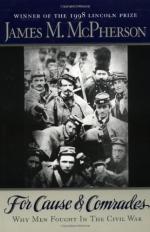
|
| Name: _________________________ | Period: ___________________ |
This test consists of 15 multiple choice questions and 5 short answer questions.
Multiple Choice Questions
1. While attempting to define the "glorious institutions" that kept men fighting during the Civil War, a soldier from which state defined it as "the guaranty of the rights of property, liberty of action, freedom of thought, religion...that kind of government that shall assure life liberty & the pursuit of happiness"?
(a) Ohio.
(b) Kentucky.
(c) Michigan.
(d) Virginia.
2. As "Chapter 7: On the Altar of My Country" begins, McPherson quotes an analysis of surviving Tennessee soldiers that showed they weren't really aware of the South's goals during the Civil War. Which decade was the analysis?
(a) 1870s.
(b) 1890s.
(c) 1910s.
(d) 1920s.
3. While discussing differing interpretations of liberty from North and South, McPherson quotes a Texas cavalryman with Forrest who wrote that the issue was all BUT WHICH of these?
(a) Slavery.
(b) Subjugation.
(c) Confiscation.
(d) Elimination.
4. When McPherson says that Confederates sought to preserve their honor by killing black soldiers who tried to surrender, which place is NOT a documented occurrence of massacres?
(a) Poison Springs.
(b) Fort Pillow.
(c) Port Royal.
(d) Plymouth.
5. When a Pennsylvania cavalry corporal wrote his mother in 1863, he listed his obligations to duty. In what position did he place his obligation to his mother?
(a) 3rd.
(b) 1st.
(c) 2nd.
(d) 4th.
6. A forty year old captain of the 18th Massachusetts wrote his wife in August 1862 that he'd rather fight for years than for his sons to continue it. In what battle was he killed four months later?
(a) Malvern Hill.
(b) Bull Run.
(c) Shiloh.
(d) Fredericksburg.
7. An Illinois cavalryman, who wrote a letter home on January 12, 1865, used the word "duty" how many times in a single sentence?
(a) 4.
(b) 8.
(c) 5.
(d) 3.
8. In "Chapter 7: On the Altar of my Country," how did soldiers frequently misspell the word "altar"?
(a) Alter.
(b) Atlar.
(c) Alttar.
(d) Alterr.
9. From which state was the major whose letter home during the summer of 1862 contained the line "slavery must be cleaned out," from which the title of the chapter was inspired?
(a) Tennessee.
(b) Wisconsin.
(c) Massachusetts.
(d) Ohio.
10. In 1863, when an infantry colonel said he began "to think no Soldier ought to be married," readers learn that he is from state?
(a) North Carolina.
(b) Wisconsin.
(c) Massachusetts.
(d) South Carolina.
11. During the discussion of what sustained soldiers during the Civil War, which of the following played a large part in maintaining morale?
(a) Religion.
(b) Parties.
(c) Mail.
(d) Battles.
12. In 1863, a thirty-three year old private in the 2nd Ohio Cavalry wrote that his side must win, lest the march of Liberty be held back by all BUT WHICH of these?
(a) Aristocrats.
(b) Monarchs.
(c) Kings.
(d) Despots.
13. McPherson says that one of the reasons for this famous Confederate general's invasion of Tennessee during November 1864 was a hope to revitalize the troops from that state. What was this general's name?
(a) General James Longstreet.
(b) General Braxton Bragg.
(c) General John B. Hood.
(d) General Jubal Early.
14. When talking about the frustrations of Union soldiers in the last two years of the war, what amount do readers learn drafted men could pay to acquire a substitute?
(a) $50.
(b) $900.
(c) $150.
(d) $300.
15. As McPherson discusses the statistics for married men versus unmarried men, what percentage of married soldiers does he say were killed in action?
(a) 48%.
(b) 23%.
(c) 13%.
(d) 67%.
Short Answer Questions
1. After the battle of Antietam a soldier in the 21st Mississippi wrote his parents that he wanted to collect what Yankee body part for his sister, Anna?
2. During the discussion of the desire to punish treason and "clean out" the rebels, a soldier from which state wrote his sister "I want to fight the rest of my life if necessary"?
3. While talking about the difficulties wives left behind faced, McPherson mentions a sergeant in the 21st Ohio whose wife had written that "your country's cause is my cause." What was her name?
4. According to "Chapter 9: Slavery Must be Cleaned Out," what fraction of Union soldiers came from Democratic backgrounds?
5. As McPherson explains Southern bitterness toward the North, from which state was the soldier who wrote in June 1863 that he felt his regiment should take horses, burn houses, and cause chaos?
|
This section contains 652 words (approx. 3 pages at 300 words per page) |

|




